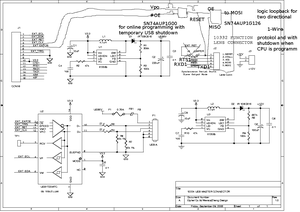Difference between revisions of "10334"
(→FPPGA vs. CPU signals) |
|||
| Line 44: | Line 44: | ||
- an external USB connector; | - an external USB connector; | ||
| − | - a 16-pin inter-board connector; | + | |
| − | - 2 pin connector for the single-wire interface | + | - a 16-pin inter-board connector; |
| + | |||
| + | - 2 pin connector for the single-wire interface; | ||
| + | |||
- 6(?) pin connector for programming of lens adapter (cable side will have a jumper between 2 pins) | - 6(?) pin connector for programming of lens adapter (cable side will have a jumper between 2 pins) | ||
Revision as of 20:21, 21 September 2005
In my board 10332 use this net 1. EXT_SCL - MISO 2. EXT_SDA - MOSI 3. EXT_RST - RESET 4. EXT_CLK - XTAL1 5. EXT_EXPOS - SCK
Your dauther board is incompatible with too. Ok.
In your shematic we can get high speed 12Mbps USB, but for programming lens control board, need to set jumper. May be use single gate logic from Texace Instrument for generate #RESET for the lens control board combination of nets #OE and Vpo. When #OE set to high level, the USB transiever is shutdown, when Vpo set to high level logic gate generate #RESET for our lens control board. We may use for example SN74AUP1G00 from Texace Instrument.
Master is the CPU board, MOSI (Master Output, Slave Input), but you connect MOSI net to INPUT pin in the CPU. The serial1 pins is not two directional, it is unidirectional, see datasheet of the CPU.
master Wensai CPU out SCK RXD1 T17 in out MOSI CTS1 V19 in in MISO TXD1 U19 out
I think this connections is correct
master CPU loop out SCK RTS1 W20 out out MOSI TXD1 U19 out * in MISO RXD1 T17 in
via external single gate element connect out MOSI with in MISO for two-direction 1-Wire protocol and for shutdown the loopback when lens board is programming mode.(SN74AUP1G126).
You can see your shematic with my bugfix follow
FPPGA vs. CPU signals
I think that it is better to use FPGA signals for the implementation of USB so we will have the freedom to start with pure software USB implementation but move it to FPGA later. Or even make it something intermediate - partially in FPGA - partially in software.
Programming of the lens adapter is not a frequent and a speed-critical operation, so we can use CPU pins for that purpose. And that operation may even require a special adapter - or what is the sense to use a single-wire interface if we have to connect programming pins also. So there is an option that finally we will have just 2 spring permanently mounted in the camera contacts for the lens adapter and additional small regular connector on the 10334 board so we can connect the lens adapter for programming to that interface (opening the camera). So it is possible to have a jumper on the cable side of the connector that will indicate that the system is in adapter programming mode.
So the 10334 board will have:
- an external USB connector;
- a 16-pin inter-board connector;
- 2 pin connector for the single-wire interface;
- 6(?) pin connector for programming of lens adapter (cable side will have a jumper between 2 pins)
